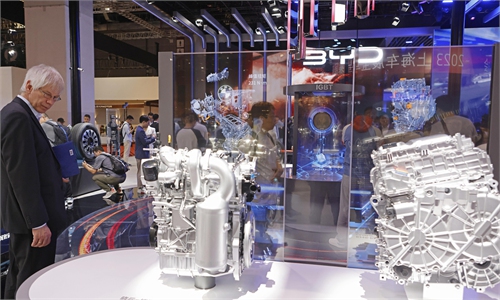
Illustration: Tang Tengfei/GT
Although there has been no official information released by BYD as of press time, Reuters reported on Friday that the Chinese automaker has told its Indian joint-venture partner that it would shelve plans for a new $1-billion investment to build electric vehicles (EVs) after its investment proposal faced unreasonable levels of scrutiny from New Delhi.
If the Reuters report is true, it is very likely BYD's case will lead to a chain reaction and deal a blow to the overall confidence of Chinese companies in investing India, which will become a loss for India's automobile manufacturing industry and the Indian economy.
Following an initial review, Indian officials from three ministries, including finance and external affairs, raised what two Indian officials described as "security concerns" about BYD's investment in partnership with Hyderabad-based Megha Engineering and Infrastructures (MEIL) and signaled opposition, Reuters reported. If so, it is disappointing and regrettable. The global auto industry we know today has been shaped by frequent cross-border investment moves for much of its history. Not many auto manufacturers have seen their plans for global expansion crimped by security concerns. If BYD is accused of causing "security concerns" solely because it's a Chinese company, such discriminatory behavior would be ridiculous, and would undermine Chinese firms' confidence over India's business environment.
BYD executives told MEIL last week that it wanted to end its pursuit of the investment, Reuters said, citing two people with knowledge of the exchange. This news has not been confirmed yet, but it has attracted much public attention, because many believe Chinese investors, who were willing to bring manufacturing investment and employment to India, will be justified and understandable if they lose patience in the face of unfair treatment, even though India's booming consumer market remains attractive. This should sound alarm bells for New Delhi's economic review of Chinese investment, as the reviews are causing losses to India's economy.
BYD and MEIL's joint venture proposed to set up an EV manufacturing plant in Telangana with a joint investment outlay of 1 billion dollars, according to media reports. This investment is expected to bring manufacturing jobs, and jobs will bring prosperity. One thing is clear: the investment would have been mutually beneficial. However, a lack of mutual trust between Chinese business community and the Indian government is a severe obstructing force to mutually-beneficial economic cooperation.
On the one hand, the Indian government does not trust Chinese enterprises, conducting reviews of Chinese investments, hyping up security concerns, and suppressing Chinese enterprises. On the other hand, Chinese companies do not trust the Indian government to provide them with a fair business environment and are concerned that investing in India may face sustained unfair treatment. If India's government rejects BYD's investment, it will probably exacerbate the lack of mutual trust and cause a chain reaction.
Efforts to strengthen cooperation are the most effective way to enhance mutual trust. BYD, the world's largest producer of EVs, entered the Indian market in 2007, producing batteries and components for mobile phone makers. The company, which has already invested over $200 million in India, markets the Atto 3 electric SUV and the e6 EV to corporate fleets and plans to launch sales of its Seal electric sedan later this year, according to Reuters. BYD has no bad business record in India. Its investment is beneficial to local economic development. Similar instances of mutually-beneficial cooperation should be encouraged rather than suppressed.
In a move that will restrict Chinese investments, India said a few years ago that government approval is required for all foreign investments from countries sharing a land border with India. Such restrictions should be abolished. China and India, as two emerging market economies, have more common interests than divergences. India needs to foster a non-discriminatory business environment so that Chinese companies can be treated fairly in the country. Only in this way can the two sides enhance rather than undermine economic mutual trust.
The author is a reporter with the Global Times. bizopinion@globaltimes.com.cn



